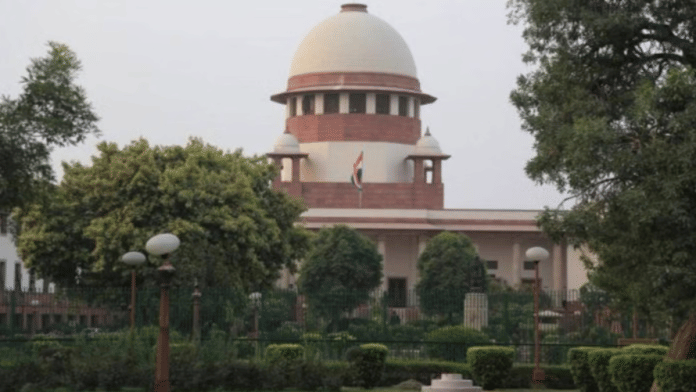New Delhi: Should police be allowed to make arrests from within court premises? The question came up before the Supreme Court, with Kerala Police Officers’ Association (KPOA) questioning Kerala High Court’s interim order framing guidelines for arrest of persons from court premises.
According to the code of conduct outlined in the 19 August interim order, police are restrained from arresting anyone from court premises during court hours. Any arrest, if necessary, can only be made with prior intimation of the presiding officer of the jurisdictional court. The high court said court premises include not just courtrooms, but also adjoining land and buildings. However, they exclude any residential quarters of judges attached to the court complex.
The KPOA has asked the Supreme Court to consider its inputs before addressing the case, saying it fears criminals might abuse the high court order and take shelter in court premises to evade police action.
A bench of justices Suryakant and Joymala Bagchi heard the association’s appeal Monday and issued notice to the Kerala government as well as the state’s High Court Bar Association.
It was on this bar body’s petition that the high court took cognizance of an alleged altercation between the lawyers of the Alappuzha District Court and the police over an arrest. The suo motu cognizance initiated in September last year led to the interim order on 19 August 2025.
During the hearing Monday, the bench voiced its concern over the increasing friction between the police and lawyers. Justice Suryakant indicated that it would take the Kerala case as an opportunity to resolve the tension between the two institutions.
In the past, constant tussles between the bar and police personnel have disrupted judicial work. Lawyers have resorted to strikes following clashes between the police and advocates, forcing judges and senior members of the legal fraternity to mediate.
According to the KPOA’s appeal, the high court order is contrary to the Bharatiya Nyaya Suraksha Samhita and the Kerala Police Act, 2011, which provide a comprehensive procedure and mechanism to arrest wanted persons in a criminal investigation.
It argued that the definition of court premises would have a crippling effect on investigation, as it almost debars the police from carrying out searches in areas that are not part of courtrooms, thereby hampering the dispensation of justice. Under the statutory framework, police are empowered to make arrests anywhere in the country.
The Kerala HC’s interim order was based on a report submitted to it by a court-constituted committee. Before that, the HC had received suggestions from the state police chief, who, after getting inputs from various stakeholders, had submitted a report to the court.
His submissions suggested various protocols regarding the conduct of police personnel within court premises. One of them said that no police personnel would arrest any person from within the court hall without the prior permission of the presiding judicial officer, unless warranted by circumstances.
However, the court favoured the recommendations by the court-constituted committee comprising the advocate general of the state, the director general of prosecution, the president of the Kerala High Court Advocates’ Association, and two senior advocates. The suggestions were made after the committee reviewed the police chief’s report.
The KPOA too made a representation before the high court, saying the police were duty-bound to execute a warrant of arrest promptly, irrespective of the physical location, and that no restrictions can be imposed, except the ones in the BNSS.
Also Read: How split HC verdict on jailed Baramulla MP Rashid’s plea flags legal vacuum on custodial parole
Court-issued guidelines
Accepting the suggestions of the committee, the HC issued interim directives to operate as guidelines in addition to the existing regulatory and statutory mechanisms.
According to the HC order, the term “court premises” is not restricted to courtrooms but extends to all structures, including land and buildings connected with the court proceedings. The order disallows police from entering during notified working hours or while the court is in session, whichever is later.
No arrest can be made without prior intimation to the presiding officer. Even a person who intends to surrender before the court in connection with any crime cannot be arrested, apprehended or detained in court premises without prior permission from the presiding officer of the jurisdictional court.
Exceptions were drawn to the above rule. The HC said police may make an aarrest in emergent situations that require immediate action to prevent a cognizable offence within the court premises or to arrest an absconding person against whom a warrant is pending.
A two-tier grievance redressal system was established in the district and state, comprising senior police officers and advocates, including bar body representatives and the advocate general of the state.
The police association’s appeal criticised the HC order, saying it was passed without “providing any independent reasons”.
“BNSS which comprehensively regulates when and how arrests are to be made by police does not create any spatial immunity for ‘Court Premises?” the appeal stated.
Court premises should only include spaces which have a direct and “proximate functional nexus to adjudication”, it added, arguing that the word “place” under the BNSS includes a house, building, tent, vehicle and vessel.
Besides, the police said a court warrant can be executed at any place in India, and upon receiving it, the owner of any premise is obligated to “grant unrestricted entry to the police officer and assist them in conducting the search to the fullest extent possible”.
Moreover, the HC guidelines amount to judicial legislation and are against the well-settled proposition of law that courts cannot encroach upon the field of the legislature.
(Edited by Sugita Katyal)
Also Read: The humble lawyer’s toolkit is going designer. It’s the age of courtroom chic






